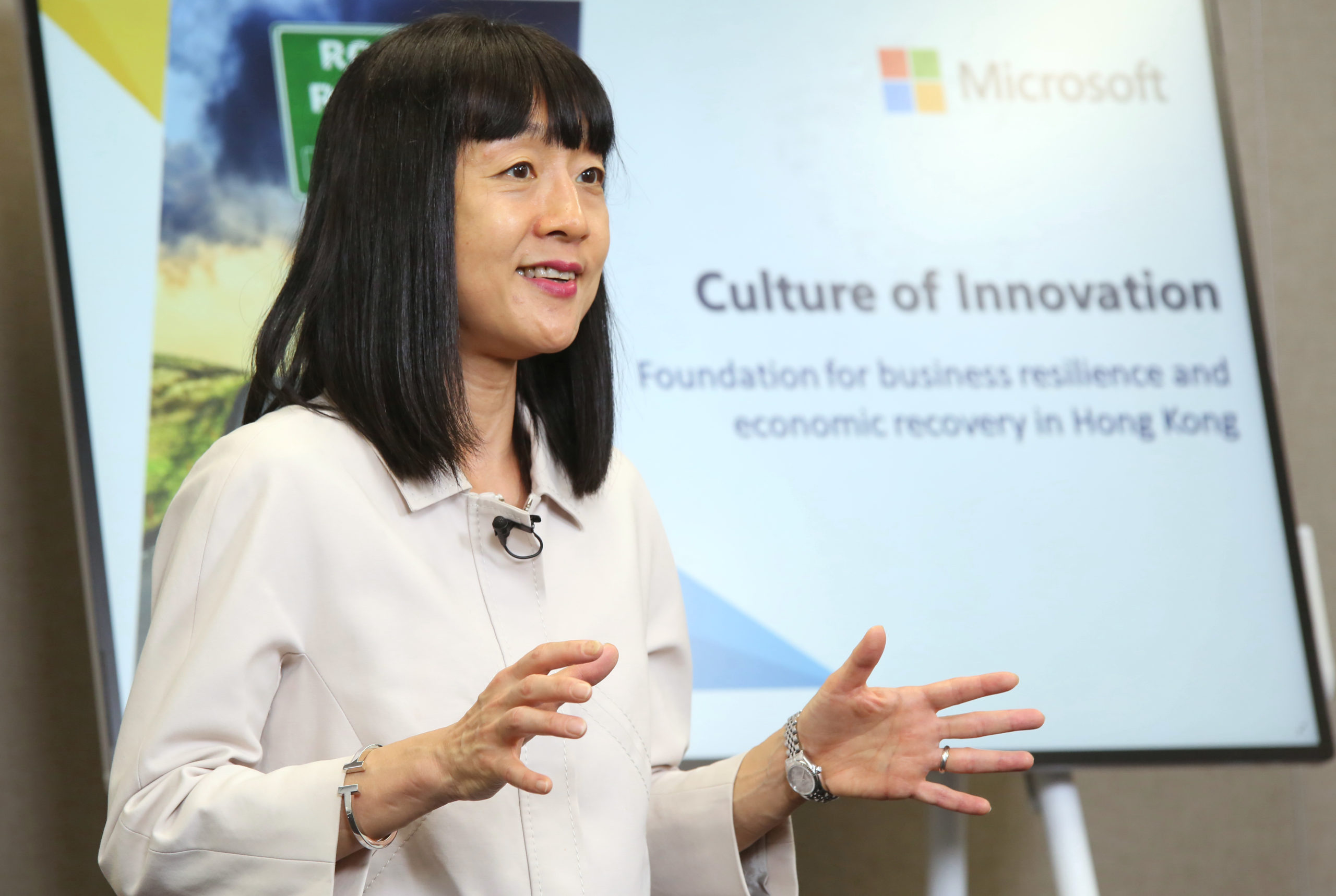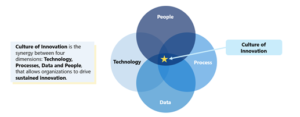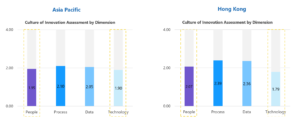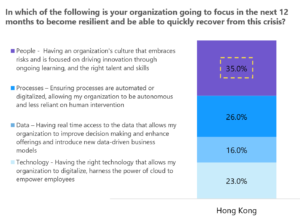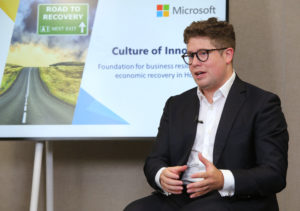-
Almost 70% organizations in Hong Kong are accelerating the pace of digitalization in response to the crisis, according to a new Microsoft-IDC study[1]
-
Since COVID-19, Hong Kong organizations have matured in their culture of innovation by 8% in 6 months’ time which similar to 11% in Asia; over 30% of Hong Kong organizations see crisis as opportunity and are more confident in business recovery
-
Culture of innovation is the synergy across People, Data, Process and Technology to drive sustained innovation. In the next 12 months, People and Technology are top priorities for Hong Kong businesses to be more resilient and recover faster
October 20, 2020, Hong Kong – Spurred by COVID-19, almost 70% (68%) of Hong Kong organizations have accelerated digitalization in a variety of ways to adapt to the new reality – from launching digital products and introducing digital payments to embracing ecommerce and automation, according to a new Microsoft-IDC study focusing in the culture of innovation. Over half (55%) of business decision-makers in Hong Kong say that innovation is now a ‘must’ for effective response to market challenges, opportunities and to ensure business resilience as they recover from the COVID-19 fallout.
“Innovation is no longer an option, but a necessity. We’ve seen how the recent crisis spurred transformation across Hong Kong, and organizations must now embed the ability to innovate into their core to effectively recover,” said Cally Chan, General Manager of Microsoft Hong Kong and Macau. “Hong Kong organizations boast a constant appetite for growth and evolution. The experience of COVID-19 has made this evident with almost half of businesses (48%) predicting their business model will lose competitiveness in five years’ time, while over half say innovation is a ‘must’ and is vital to performance and resilience. Hong Kong’s desire and urgency for continuous improvement will ensure the success of businesses in this new normal.”
Businesses have realized how their ability to embrace challenges and to innovate directly fuels performance and business resilience during the crisis. A third (34%) of organizations in Hong Kong viewed COVID-19 as an opportunity – with these organizations expected to perform better than their counterparts. They are 1.3 times more confident they will recover their businesses within 3 months or faster, and 3.3 times more confident to grow revenue despite the crisis.
“Over half of these organizations said such confidence stems from the ability to innovate. This demonstrates that innovation is the key differentiator and Hong Kong organizations have the potential to further develop and embrace a culture of innovation to accelerate their transformation,” explained Victor Lim, Vice President, Consulting Operations, IDC Asia/Pacific.
These findings were released by Microsoft in its latest study with IDC Asia Pacific which surveyed 200 business decision makers and 219 workers in Hong Kong within a 6-month period, before and since COVID-19. The Hong Kong study was part of a broader survey among 3,312 business decision makers and 3,495 workers across 15 markets in Asia Pacific conducted over the same time-period. Titled “Culture of Innovation: Foundation for business resilience and economic recovery in Asia Pacific”, it uncovered how organizations can successfully fuel business resilience and performance through innovation.
Assessing organizational maturity for culture of innovation
The study introduced the culture of innovation framework, which captures success organizations’ approach to innovation. Through the research, organizations’ maturity was mapped against four dimensions – people, processes, data and technology.
The study found that in the span of six months, organizations in Hong Kong have matured in a culture of innovation by 8%, an indication that they have increased their ability to innovate. In comparison, organizations in Asia Pacific saw an 11% growth in culture of innovation maturity.
Fig 1: Culture of Innovation Framework
People and Technology top priorities for improvement in Hong Kong
Hong Kong organizations are more mature than Asia Pacific average across all dimensions of Culture of Innovation except Technology. Hong Kong businesses have potential to further improve on Technology and People, which are also the weakest dimensions in the culture of innovation across Asia Pacific.
Fig 2: Organizations in Hong Kong are more mature across all dimensions except Technology and share common weak areas with Asia Pacific average which are People and Technology
When asked about their priorities for the next 12 months ahead, organizations in Hong Kong indicated that they will focus on people (35%) as the most essential for business resilience and recovery.
Fig 3: People as the top focus areas for organizations in Hong Kong (%)
Moving forward, Hong Kong organizations’ top strategies in long-term to future proof business and be more resilient are to cast a strong corporate vision, clear direction and agile decision making from leadership, and to instill corporate culture and mindset to embrace risks and ambiguity.
“It is encouraging to see business leaders in Hong Kong recognize that focus on people and culture is crucial to drive sustained innovation and realize the digital transformation ambition,” said Chan. “Achieving success in digital transformation requires both the adoption of tools and technologies as well as own people’s capabilities – what we term as tech intensity – a critical component of the culture of innovation.”
Bucking the traditional perception of the industry, Gammon Construction is breaking the mold by reinventing itself with a transformation program across the entire organization, including all of its construction sites across the city. Gammon Construction adopted Microsoft Teams to break down siloes and go digital. Governing this breakthrough move, it created the “G7”, an internal steering committee to drive innovation and cultural change.
“While technology is a key enabler, culture is probably 80% of the challenge within our transformation journey,” said James Thompson, Head of Digital at Gammon Construction. “We have taken a three-point strategy to ensure innovation culture and new processes are deeply embedded. The first is a top down ‘train the trainer’ approach to upskill and implement Information Managers across the organization. We also identified high-potential junior talents who are curious and tech-savvy to drive change. Lastly, we make all new technology user-friendly and value oriented. Culture change requires ongoing, consistent effort – encouraging collaboration is also a key part of our strategy and Microsoft Teams has really helped us break down siloes to help every worker do their job easier and ultimately better.”
James Thompson, Head of Digital at Gammon Construction, shared how the company reinvented itself with a digital transformation program across the entire organization to drive innovation and cultural change
Culture of innovation – a success formula for resilience and faster economic recovery
Using the culture of innovation framework, the study revealed the best practices that organizations can adopt to progress across people, technology, data and process.
Specifically, organizations are encouraged to:
- Fortify resilience with technology
Strengthen the organization’s approach to digital transformation through resilient technologies allowing simplification, flexibility and agility – cloud, artificial intelligence and machine learning. At the same time, ensure that cybersecurity is infused into the organization’s digital footprint.
- Invest in people’s capabilities and skills
Create open and inclusive environment to attract the best and diverse talent. Integrate workplace innovation efforts that will be crucial to accelerate transformation, ensuring the right rewards and incentives to encourage innovation and upskilling to sustain the pace of innovation, by unlocking people’s capabilities.
- Leverage data to increase competitiveness
Capitalize on the value of data through developing new data-driven products and services and revenue streams for organization’s competitiveness. Democratize data to empower data driven culture. It will be key that data-driven insights are leveraged for enterprise-wide collaboration and decision-making to institute a knowledge sharing culture.
- Redesign processes to empower people to continuously drive innovation
Create a systematic approach to drive innovation – from ideation to commercialization and establish a centralized digital transformation budget, along with digital KPIs. Customer centricity should be at the heart of continuous improvements, and a feedback loop is necessary to capture learnings on an ongoing basis.
“It’s imperative that people are equipped to collaborate and encouraged to drive sustained innovation. Our goal is to realize an inclusive future where all organizations in Hong Kong are dynamic and resilient – to recover well and thrive despite the crisis. At Microsoft, we are committed to working with organizations in Hong Kong to make this happen, together,” concluded Cally Chan, General Manager of Microsoft Hong Kong and Macau.
[1]Research background for Culture of Innovation: Foundation for business resilience and economic recovery in Asia Pacific:
- The study was conducted in two phases – Phase 1 (Pre-COVID; Dec 2019-Jan 2020) and Phase 2 (Since COVID-19; July 2020). Phase 1 – 1,622 business leaders and 1,823 workers (206 business leaders and 224 workers in Hong Kong) participated; Phase 2 – 1,690 business leaders and 1,672 workers (233 business leaders and 214 workers in Hong Kong) participated. Participants from organizations with more than 250 staff were polled.
- 15 Asia Pacific markets were involved: Australia, China, Hong Kong, Indonesia, India, Japan, Korea, Malaysia, New Zealand, Philippines, Singapore, Sri Lanka, Taiwan, Thailand, and Vietnam.
###
About Microsoft
Microsoft (Nasdaq “MSFT” @microsoft) enables digital transformation for the era of an intelligent cloud and an intelligent edge. Its mission is to empower every person and every organization on the planet to achieve more.

